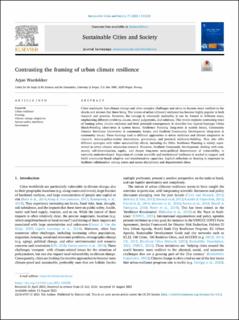Contrasting the framing of urban climate resilience
Journal article, Peer reviewed
Published version

Åpne
Permanent lenke
https://hdl.handle.net/11250/2788281Utgivelsesdato
2021Metadata
Vis full innførselSamlinger
Sammendrag
Cities worldwide face climate change and other complex challenges and strive to become more resilient to the shocks and stresses that these bring. The notion of urban (climate) resilience has become highly popular in both research and practice. However, the concept is inherently malleable; it can be framed in different ways, emphasising different problems, causes, moral judgements, and solutions. This review explores contrasting ways of framing urban climate resilience and their potential consequences. It identifies four typical framings: Urban Shock-Proofing (short-term & system focus), Resilience Planning (long-term & system focus), Community Disaster Resilience (short-term & community focus), and Resilient Community Development (long-term & community focus). These framings lead to different approaches to urban resilience and climate adaptation in research, science-policy-society interactions, governance, and practical resilience-building. They also offer different synergies with wider sustainability efforts, including the SDGs. Resilience Planning is widely represented in urban climate adaptation research. However, Resilient Community Development, dealing with community self-determination, equity, and deeper long-term socio-political determinants of vulnerability, is currently underdeveloped. Expansion of current scientific and institutional toolboxes is needed to support and build community-based adaptive and transformative capacities. Explicit reflection on framing is important to facilitate collaboration among actors and across disciplinary and departmental siloes.
